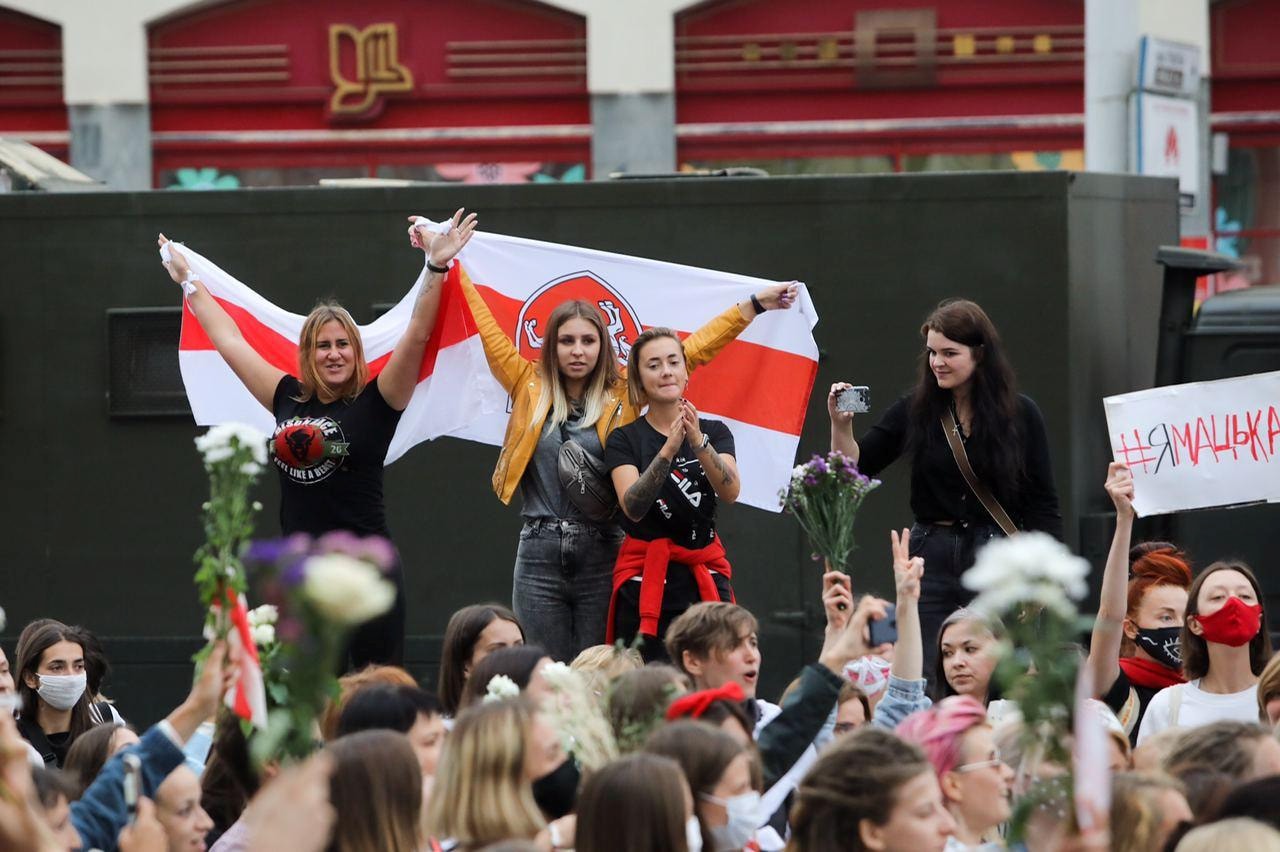Belarus tightens grip on foreign media as anti-government protests swell

The moves against journalists triggered fears that Lukashenko may be planning harsh new measures to crush the peaceful protests, touched off by Lukashenko’s declaration of a landslide victory in Aug. 9 elections. Opposition groups and Western governments have rejected the election results.
Riot police also arrested journalists covering a women’s protest march in Minsk Saturday afternoon. Protesters wore white and red, carried white-and-red flags — the colors of the Belarusian republican flag used from 1991 to 1995 — and chanted for Lukashenko to step down after 26 years in power.
Alexander Vasilievich, co-founder of two independent online media outlets that have played a key role in covering the crisis, Kyky.org and the Village Belarus, was arrested Friday, according to his wife Nadezhda Zelenkova, who posted the information Saturday on Facebook.
The decision to strip journalists’ accreditation was made by the Belarus Security Council commission on preventing terrorism and extremism, which gave no reason.
It came after riot police rounded up dozens of local and international reporters Thursday, many of whom were later released. Some were held and charged with illegal assembly.
The U.S. Embassy in Belarus on Saturday called for an end to the crackdown on media.
“We are concerned about the continued harassment of journalists, the blocking of independent media and opposition websites, periodic Internet cuts and arbitrary detentions of civilians exercising their rights to freedom of assembly and speech,” the embassy said in a statement.
Former British ambassador to Belarus Nigel Gould-Davies, a senior fellow with the International Institute for Strategic Studies, called the media crackdown “extremely worrying.”
“You only do this if you are going to do something you don’t want the world to see,” he wrote on Twitter.
Opposition leader Svetlana Tikhanovskaya, in self-exile in Lithuania, said the move “is another sign that this regime is morally bankrupt, and the only way it is trying to stay in power is through fear and intimidation. This tactic will not work. The Belarusian people are no longer afraid. We will win.”
Among those stripped of accreditation were journalists from the BBC, U.S.-funded Radio Free Europe/Radio Liberty, Russian-language Current Time TV, which is associated with Voice of America and led by RFE/RL, Reuters, Deutsche Welle and German broadcaster ARD.
Daisy Sindelar, acting president of RFE/RL, said the move against journalists was designed to stifle access to credible information about the crisis.
“Stripping our journalists of accreditation on grounds of ‘extremism’ is a desperate and ominous move by an authoritarian government to stifle the independent media and ruthlessly control the availability of credible information inside Belarus. It’s a violation of international standards and an assault on the Belarusian people who rely on us,” she said in comments published on the RFE/RL website.
Even before the election, Lukashenko threatened in late July to ban journalists from the BBC and REF/RL, falsely accusing them of calling for revolution. Authorities also denied election accreditation to many international media seeking access to the country, in an apparent effort to minimize international scrutiny of the election.
Lukashenko, a former collective farm manager, has held power since then through flawed elections, jailing opponents and critics, blocking rivals from contesting elections and harsh crackdowns on protests.
According to the official Aug. 9 election result of the Belarus Election Commission, Lukashenko gained 80.1 percent of the vote compared with 10.2 percent for Tikhanovskaya. She ran as a united opposition candidate after the three main opposition candidates were jailed or barred from running.
As protesters took to the streets after the announcement of election result, riot police responded with violence. At least 7,000 protesters were arrested, and hundreds were harshly beaten. At least three protesters died.
U.S. and European leaders rejected the election result prompting Lukashenko to turn to Russian President Vladimir Putin, who has long sought close integration between Russia and neighboring Belarus, given its strategic borders with NATO and Ukraine. Russia and Belarus signed a union treaty on a joint currency and institutions in 1999 but until now Lukashenko has stalled moving forward.
Putin last week said Russia was ready to send a force to Belarus if the situation got “out of control,” citing examples such as protesters starting to burn cars or loot.
In recent days, Lukashenko has been sounding alarm bells, claiming a security crisis, with frequent references to NATO tanks closing in on Belarus’s border and “caterpillar tracks clanking.” NATO Secretary General Jens Stoltenberg last week rejected any suggestion NATO was gathering forces, warning Lukashenko against using this as an excuse for a crackdown on protesters.
“There is no NATO buildup in the region, so any attempt by the regime to use this as an excuse to crack down on peaceful protesters is absolutely wrong and unjustified,” he said Wednesday.
Tikhanovskaya, whose husband Sergei ran for president and was jailed, sent her two children to Lithuania before the vote. After unsuccessfully trying to lodge a challenge against the results at the Central Election Commission, she fled the country.
From Lithuania she has called on people to protest, workers in state factories to go on strike and members of the security forces to join the opposition. She also set up a Coordination Council including prominent members of society to negotiate a power transition.
Lukashenko rebuffed the council, and authorities arrested two of its members, Olga Kovalkova and Sergei Dylevskiy. The pair were transferred Saturday from a police detention center to Zhodino Prison, according to the press office of the council.
Police interrogated another council member, Nobel Prize-winning author Svetlana Alexievich, on Wednesday but later released her.
Authorities have charged another key opposition organizer, Yuri Voskresensky, with organizing protests. He was on the team of another one of Lukashenko’s jailed election rivals, former banker Viktor Babariko. Two other Babariko campaign members, Vitaly Krivko and Andrei Yaroshevich, were also arrested, according to local media.






